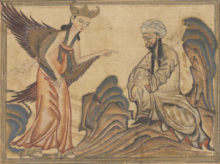The Truth About Muhammad
Written from a critical perspective towards its subject, this book examines the life of Muhammad in ten chapters based on the sources provided by his early biographers, together with the Quran and the hadith, while also challenging their historical authenticity.
A work of American author and counter-jihadist Robert Spencer, the book is a biography of Muhammad, who founded Islam (an Abrahamic religion that originated in the 7th-century Arabic Peninsula), where he is regarded as the last prophet sent by God.
Spencer then describes the pivotal role of Muhammad's later-wife Khadija bint Khuwaylid, who would be the first one to convert to Islam; this took place after he reportedly received his first visitation by the archangel Gabriel in the cave of Jabal al-Nour.
[9] Armstrong found Spencer unable to understand Muhammad in the cultural, economic, historical, political and spiritual circumstances of 7th-century Arabian Peninsula, leading him to making "basic and bad mistakes of fact".
[9] She wrote that non-Muslims' ignorance of Islam would be really helpful for Spencer to achieve his anti-Islamic aim, mockingly describing his book as a gift for extremists of the same views "to 'prove' to those Muslims who have been alienated by events in Palestine, Lebanon and Iraq that the west is incurably hostile to their faith".
[11] While presenting itself as a biography of Muhammad, Maldonado felt nothing biographical in this book since, he believed, it is more a chronicle of "the more negative and controversial aspects" of its subject and provides nothing beneficial to the historiography of Islam.
), Indonesian author Muhammad Nurhidayat suggested Spencer to learn from the works of objective scholars, including Armstrong, John Esposito, William Muir and W. Montgomery Watt, before writing his own book.
[14] Bower continued that, in spite of its critical tones, he regarded the book undoubtfully as "an essential resource, a reliable and duly documented account of who Muhammad really was, and a challenge to those who would assume that his actions and his life are perfectly just within the framework of Western society".
Deepika Bains and Aziza Ahmed of the Asian American Law Journal condemned Spencer for his failure to have an objective stance; for instance, he used the negatively connoted mujehedins and jihadists to refer to Muslims.
[19] The reviewers also noted many statements by Spencer that were not founded on provable evidence but his personal opinion, such as claiming that investigations for a historic Muhammad would not get a significant audience in Islamic world.
[19] They concluded that, with all the book's lack of analysis and historical context, "The Truth About Muhammad accomplishes Spencer's goal of vilifying Muslims and misinforming readers about Islam ...
"[20] University of Cape Town professor of religious studies Abdulkader Tayob argued that while the book presents itself as a biography of Muhammad, it however "intends to say something more specifically about Muslims".
"[21] Author of interfaith dialogue Craig Considine cited the book as one of the many popular examples in the 21st century in which Muhammad has been misportrayed as a cruel figure, pedophile and one who discriminates against religious minorities like Jews and Christians.
[22] Joseph S. Spoerl of the Middle East Quarterly wrote a more positive review; he commented that the biography "deserves a wide audience" but opined that its title is sensationalistic and noted a number of chronological mistakes, such as dating the Expedition of Tabuk to 631.

